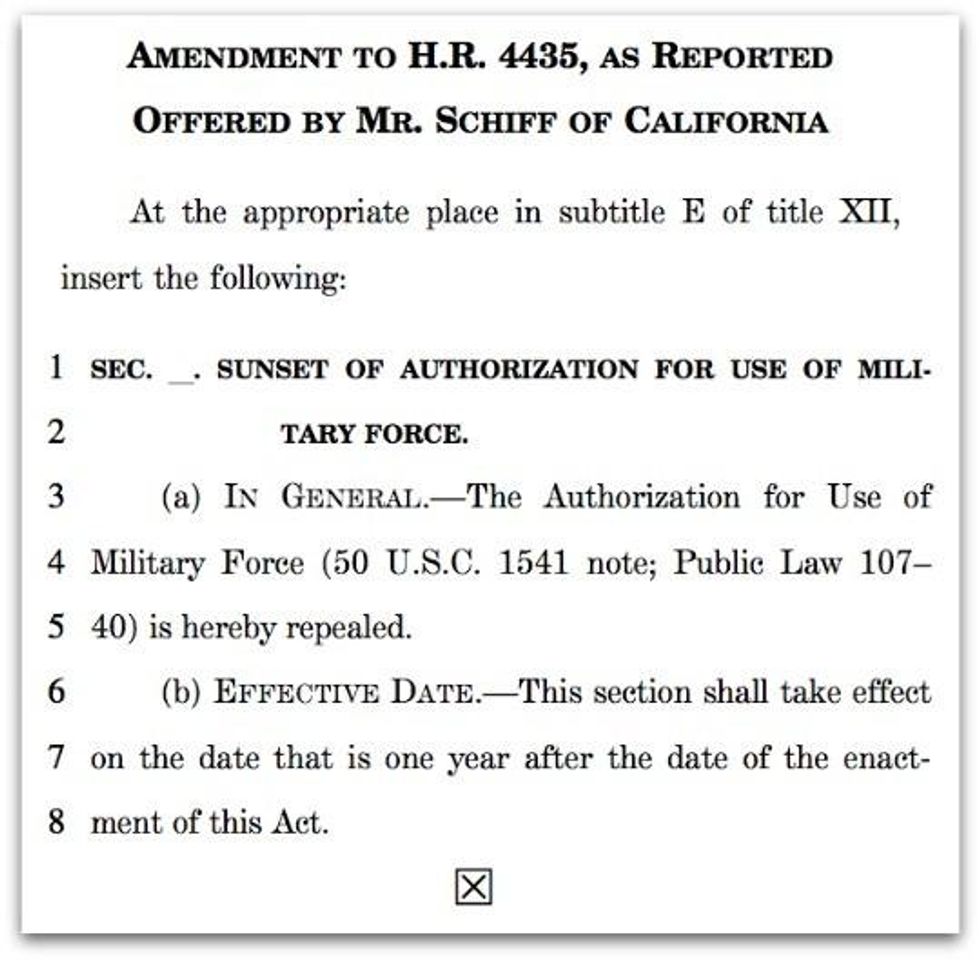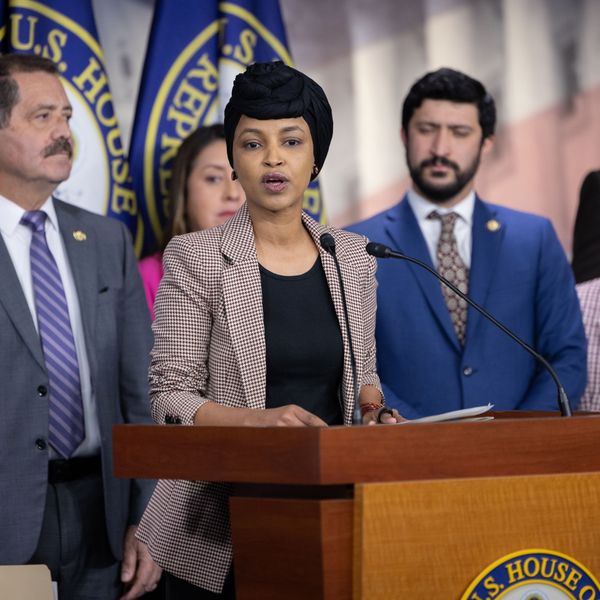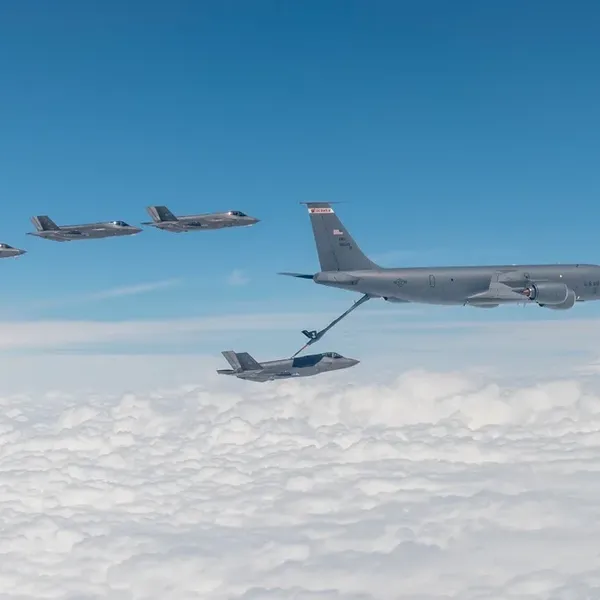Is Congress Moving to End 'Endless War' or Expand It?
As renewed focus turns to legal authority that underpins US 'war on terror' - the cure may be as vile as the disease
The proposed amendment is short, but if passed by the House of Representatives in a vote that could arrive Wednesday afternoon, it could also be sweet--especially for those who have pushed hardest to end the 2001 Authorization to Use Military Force (or AUMF) which has provided the legal basis for America's so-called "global war on terrorism."
As Common Dreams reported last week, the the AUMF--which has neither an expiration date or sunset clause--has been a greenlight for "endless war" since shortly after the 9/11 attacks. Repeatedly extended, the authorization has opened the door to expansive interpretations by the executive branch, sidestepping congressional war powers and largely locking out the opposition from an American public increasingly tired of a permanent war posture.
Introduced for debate as part of this year's National Defense Authorization Act (NDAA), now passing through the house, the amendment (pdf) by Rep. Adam Schiff (D-Calif.) is only eight lines long and looks like this:

That's the entirety of the amendment. But should those thirty-one words be added to the NDAA, the effect would be extremely wide reaching, erasing the scope of the sixty words that it would be replacing in the way that the United States conducts operations against terrorists overseas. In the years after Congress hastily passed the 2001 AUMF, both the Bush and Obama administrations have used it to conduct operations in places like Yemen, Pakistan, and Somalia where no declaration of war exists, but the local government allows the presence of special operators, unmanned drones, and missile strikes on their soil. Pulling back on that ability has been the goal of many almost since the AUMF was put into place, but now the landscape appears to be shifting away from those who would rather keep it intact.
Well, that's one interpretation.
It may not be so straight-forward, however. As the House prepares to the AUMF debate to the floor, the Senate Armed Services Committee held its own hearing on the AUMF on Wednesday morning. And as the Guardian's Spencer Ackerman reports, lawyers representing the Obama administration's position on the law's war-making authority "received frustration and skepticism from senators of both parties after arguing that the it ought to be repealed - just not quite yet."
According to Ackerman's coverage of the hearing, the Obama officials--whose arguments were "reminiscent of those made by Dick Cheney"--indicates the White House is inclined to support a reworking of the AUMF so long as it involves expanding the scope and a firmer codification of its increasingly ambiguous authority.
And when it comes to Schiff's position on what the Obama administration may like to see, it becomes more unclear if either "repeal" or "reform" of the AUMF would really mean the end to the war in Afghanistan, the off-shore prison at Guatanamo, or the drone and targeted killing programs that are quickly spreading from Central Asia and the Middle East to regions of east and now west Africa.
As Ackerman reports, Schiff told Ackerman that if repeal was not possible he would "regrettably" support Congress passing a new and more limited AUMF that would comport with what the Obama administration's demands for a newly conceived operation to conduct counter-terrorists military operations in numerous countries across the globe and against quasi-military forces that are not necessarily al-Qaeda.
In other words: new authorization, more war, better defined, and less restrictions.
"The administration is on its strongest constitutional footing when it acts in concert with Congress," Schiff told Ackerman. And that may not be a good thing for those opposed to the permanent war against a nebulous, impossible to defeat enemy like "terrorism."
If bi-partisan agreement is reached on the need to re-cast the AUMF for the decades ahead, the next question is the same as the current one: Will America's endless war ever end?
An Urgent Message From Our Co-Founder
Dear Common Dreams reader, The U.S. is on a fast track to authoritarianism like nothing I've ever seen. Meanwhile, corporate news outlets are utterly capitulating to Trump, twisting their coverage to avoid drawing his ire while lining up to stuff cash in his pockets. That's why I believe that Common Dreams is doing the best and most consequential reporting that we've ever done. Our small but mighty team is a progressive reporting powerhouse, covering the news every day that the corporate media never will. Our mission has always been simple: To inform. To inspire. And to ignite change for the common good. Now here's the key piece that I want all our readers to understand: None of this would be possible without your financial support. That's not just some fundraising cliche. It's the absolute and literal truth. We don't accept corporate advertising and never will. We don't have a paywall because we don't think people should be blocked from critical news based on their ability to pay. Everything we do is funded by the donations of readers like you. Will you donate now to help power the nonprofit, independent reporting of Common Dreams? Thank you for being a vital member of our community. Together, we can keep independent journalism alive when it’s needed most. - Craig Brown, Co-founder |
The proposed amendment is short, but if passed by the House of Representatives in a vote that could arrive Wednesday afternoon, it could also be sweet--especially for those who have pushed hardest to end the 2001 Authorization to Use Military Force (or AUMF) which has provided the legal basis for America's so-called "global war on terrorism."
As Common Dreams reported last week, the the AUMF--which has neither an expiration date or sunset clause--has been a greenlight for "endless war" since shortly after the 9/11 attacks. Repeatedly extended, the authorization has opened the door to expansive interpretations by the executive branch, sidestepping congressional war powers and largely locking out the opposition from an American public increasingly tired of a permanent war posture.
Introduced for debate as part of this year's National Defense Authorization Act (NDAA), now passing through the house, the amendment (pdf) by Rep. Adam Schiff (D-Calif.) is only eight lines long and looks like this:

That's the entirety of the amendment. But should those thirty-one words be added to the NDAA, the effect would be extremely wide reaching, erasing the scope of the sixty words that it would be replacing in the way that the United States conducts operations against terrorists overseas. In the years after Congress hastily passed the 2001 AUMF, both the Bush and Obama administrations have used it to conduct operations in places like Yemen, Pakistan, and Somalia where no declaration of war exists, but the local government allows the presence of special operators, unmanned drones, and missile strikes on their soil. Pulling back on that ability has been the goal of many almost since the AUMF was put into place, but now the landscape appears to be shifting away from those who would rather keep it intact.
Well, that's one interpretation.
It may not be so straight-forward, however. As the House prepares to the AUMF debate to the floor, the Senate Armed Services Committee held its own hearing on the AUMF on Wednesday morning. And as the Guardian's Spencer Ackerman reports, lawyers representing the Obama administration's position on the law's war-making authority "received frustration and skepticism from senators of both parties after arguing that the it ought to be repealed - just not quite yet."
According to Ackerman's coverage of the hearing, the Obama officials--whose arguments were "reminiscent of those made by Dick Cheney"--indicates the White House is inclined to support a reworking of the AUMF so long as it involves expanding the scope and a firmer codification of its increasingly ambiguous authority.
And when it comes to Schiff's position on what the Obama administration may like to see, it becomes more unclear if either "repeal" or "reform" of the AUMF would really mean the end to the war in Afghanistan, the off-shore prison at Guatanamo, or the drone and targeted killing programs that are quickly spreading from Central Asia and the Middle East to regions of east and now west Africa.
As Ackerman reports, Schiff told Ackerman that if repeal was not possible he would "regrettably" support Congress passing a new and more limited AUMF that would comport with what the Obama administration's demands for a newly conceived operation to conduct counter-terrorists military operations in numerous countries across the globe and against quasi-military forces that are not necessarily al-Qaeda.
In other words: new authorization, more war, better defined, and less restrictions.
"The administration is on its strongest constitutional footing when it acts in concert with Congress," Schiff told Ackerman. And that may not be a good thing for those opposed to the permanent war against a nebulous, impossible to defeat enemy like "terrorism."
If bi-partisan agreement is reached on the need to re-cast the AUMF for the decades ahead, the next question is the same as the current one: Will America's endless war ever end?
The proposed amendment is short, but if passed by the House of Representatives in a vote that could arrive Wednesday afternoon, it could also be sweet--especially for those who have pushed hardest to end the 2001 Authorization to Use Military Force (or AUMF) which has provided the legal basis for America's so-called "global war on terrorism."
As Common Dreams reported last week, the the AUMF--which has neither an expiration date or sunset clause--has been a greenlight for "endless war" since shortly after the 9/11 attacks. Repeatedly extended, the authorization has opened the door to expansive interpretations by the executive branch, sidestepping congressional war powers and largely locking out the opposition from an American public increasingly tired of a permanent war posture.
Introduced for debate as part of this year's National Defense Authorization Act (NDAA), now passing through the house, the amendment (pdf) by Rep. Adam Schiff (D-Calif.) is only eight lines long and looks like this:

That's the entirety of the amendment. But should those thirty-one words be added to the NDAA, the effect would be extremely wide reaching, erasing the scope of the sixty words that it would be replacing in the way that the United States conducts operations against terrorists overseas. In the years after Congress hastily passed the 2001 AUMF, both the Bush and Obama administrations have used it to conduct operations in places like Yemen, Pakistan, and Somalia where no declaration of war exists, but the local government allows the presence of special operators, unmanned drones, and missile strikes on their soil. Pulling back on that ability has been the goal of many almost since the AUMF was put into place, but now the landscape appears to be shifting away from those who would rather keep it intact.
Well, that's one interpretation.
It may not be so straight-forward, however. As the House prepares to the AUMF debate to the floor, the Senate Armed Services Committee held its own hearing on the AUMF on Wednesday morning. And as the Guardian's Spencer Ackerman reports, lawyers representing the Obama administration's position on the law's war-making authority "received frustration and skepticism from senators of both parties after arguing that the it ought to be repealed - just not quite yet."
According to Ackerman's coverage of the hearing, the Obama officials--whose arguments were "reminiscent of those made by Dick Cheney"--indicates the White House is inclined to support a reworking of the AUMF so long as it involves expanding the scope and a firmer codification of its increasingly ambiguous authority.
And when it comes to Schiff's position on what the Obama administration may like to see, it becomes more unclear if either "repeal" or "reform" of the AUMF would really mean the end to the war in Afghanistan, the off-shore prison at Guatanamo, or the drone and targeted killing programs that are quickly spreading from Central Asia and the Middle East to regions of east and now west Africa.
As Ackerman reports, Schiff told Ackerman that if repeal was not possible he would "regrettably" support Congress passing a new and more limited AUMF that would comport with what the Obama administration's demands for a newly conceived operation to conduct counter-terrorists military operations in numerous countries across the globe and against quasi-military forces that are not necessarily al-Qaeda.
In other words: new authorization, more war, better defined, and less restrictions.
"The administration is on its strongest constitutional footing when it acts in concert with Congress," Schiff told Ackerman. And that may not be a good thing for those opposed to the permanent war against a nebulous, impossible to defeat enemy like "terrorism."
If bi-partisan agreement is reached on the need to re-cast the AUMF for the decades ahead, the next question is the same as the current one: Will America's endless war ever end?

